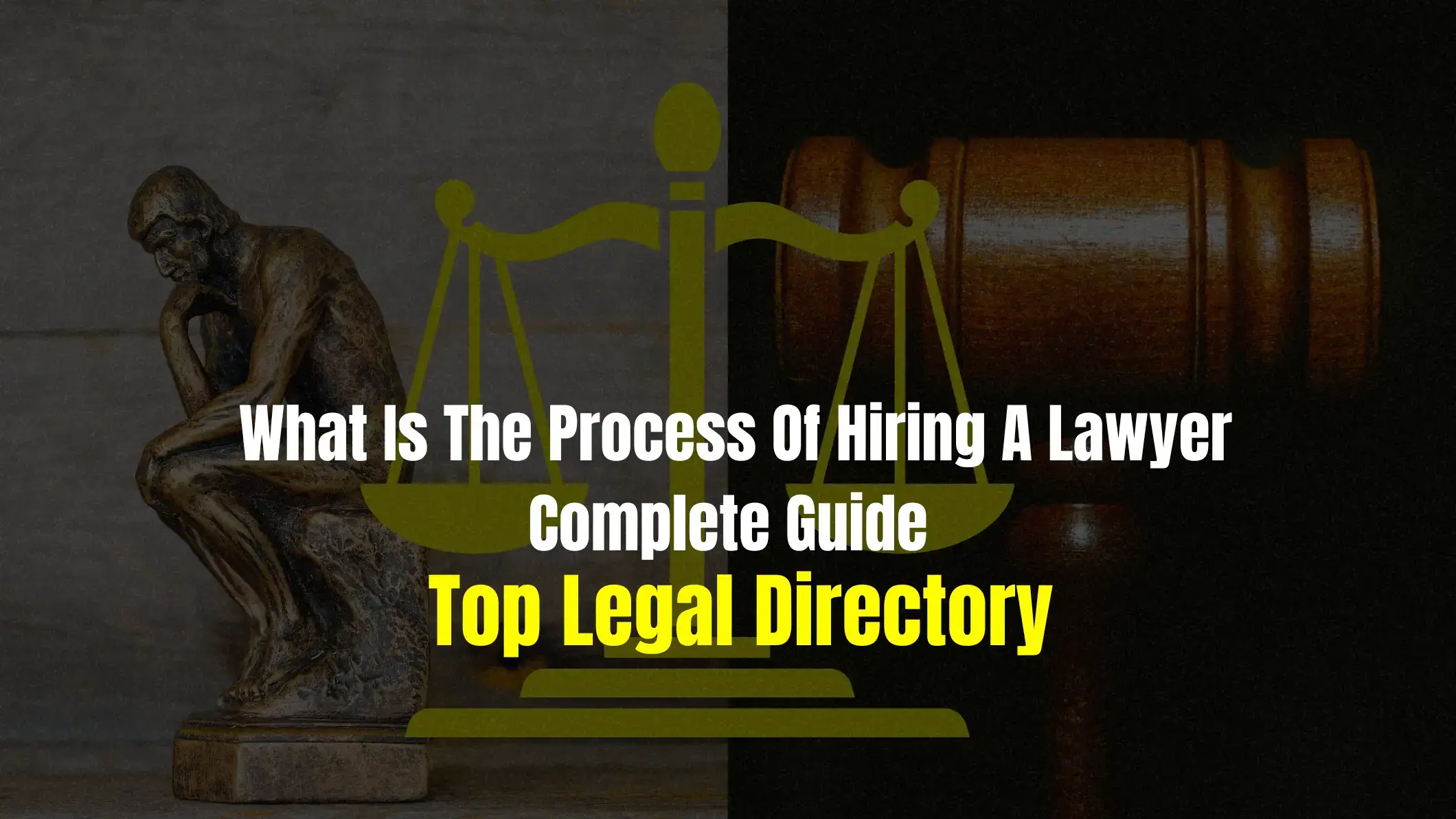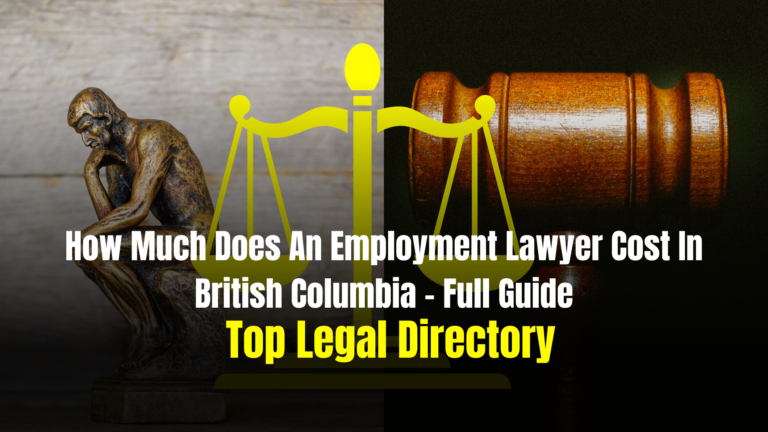What Is The Process Of Hiring A Lawyer – Complete Guide
Delving into the complex labyrinth of legal matters can be daunting, especially when you’re on the verge of securing legal counsel. This pivotal move, frequently the starting point for many on their legal odyssey, can dictate the trajectory of the ensuing events.
So, how can you be certain you’re selecting the right advocate? What is the process of hiring a lawyer?
In essence, it involves understanding your legal problem, seeking out an experienced lawyer, gauging their communication skills, assessing their approach to legal issues, opting for someone familiar with the regional legal intricacies, and recognizing the lawyer’s specialty before committing.
What is the Process of Hiring a Lawyer – A Quick Overview
When you’re faced with a legal conundrum, hiring the right lawyer can be the deciding factor between success and setback. The process is more manageable than it might seem at first. Begin by crystalizing your legal dilemma.
With this clarity, zero in on a lawyer with pertinent experience, ensuring they resonate with your communication expectations. Their approach to legal challenges should mirror your sentiments. Additionally, a lawyer’s familiarity with local legal nuances can be an invaluable asset.
Finally, ensure that their specialization aligns with your specific legal needs. Think of it as finding the perfect outfit – the right fit can make all the difference, and in the legal world, it can be your shining armour.
Use our directory to Find a Top Lawyer.
Getting a Lawyer on Your Side: Step-by-Step Guide
Embarking on the journey to hire a lawyer can seem overwhelming, but understanding the process can make it much more manageable.
Knowing what to look for, which questions to ask, and what expectations to have can significantly impact the outcome of your legal matters.
Let’s dive deep into the systematic approach to hiring the right legal representative.
Know the Legal Problem
Every legal journey starts with identifying the nature of the problem. Whether it’s a dispute, a claim, or a case for defence, pinpointing your specific issue is the key. Here are a few steps to assist you:
- Identify the Core Issue: Is it a business dispute, personal injury claim, or a family law matter?
- Research Basic Legal Information: Understand the fundamentals related to your problem. For instance, if it’s a business dispute, know the general laws that might apply.
- Consult Preliminarily: Sometimes, talking to friends or family who’ve been through similar situations can offer insights.
- Determine the Type of Lawyer Needed: Different issues require specialized lawyers. Recognizing this early on can streamline the process.
By understanding the nuances of your legal predicament, you can ensure you’re guided by an expert in that realm.
Look for an Experienced Lawyer
The realm of law is vast, and specialization is crucial. Here’s how to narrow down your search:
- Search for Specialized Lawyers: If you have a family law issue, look for lawyers specializing in that area.
- Ask About Years of Practice: A seasoned lawyer usually brings a wealth of experience to the table.
- Check Their Past Cases: A lawyer’s history with cases similar to yours can give you an idea of their expertise and approach.
- Seek Recommendations: Personal recommendations can be invaluable. If someone you trust had a good experience with a lawyer, it might be worth considering them.
Check the Educational background of the Lawyer
When it comes to legal representation, educational background matters:
- Verify Their Law Degree: Ensure the lawyer has graduated from an accredited law school.
- Look for Additional Qualifications: Courses, seminars, or certifications related to your issue can set a lawyer apart.
- Membership in Professional Associations: Associations often have stringent standards, which can be an indicator of professionalism.
Analyze Communication Skills
In legal matters, clear communication is essential:
- Initial Consultation: During your first meeting, notice how the lawyer communicates. Are they attentive and thorough?
- Ask Questions: This will not only clarify your doubts but also give you a sense of the lawyer’s communication style.
- Check Responsiveness: How quickly does the lawyer or their office respond to your calls or emails?
Determine the Lawyer’s Approach Towards Legal Matters
Your comfort with a lawyer’s approach is critical:
- Ask About Their Strategy: Will they be aggressive from the start, or are they open to negotiations?
- Understand Their Philosophy: Some lawyers believe in a quick settlement, while others might prepare for a long battle.
- Consider Your Comfort Level: You should feel at ease with the chosen approach, as it can impact your peace of mind throughout the legal process.
Look for a Lawyer Familiar with the Region
While the core principles of law may be universal, local interpretations and practices can vary widely. A lawyer with local expertise offers:
- Knowledge of Regional Laws: Certain by-laws, regulations, or statutes might be specific to a region. A locally experienced lawyer would be acutely aware of these.
- Connections with Local Judiciary: Being familiar with local judges and their decision-making tendencies can provide strategic advantages.
- Understanding of Local Procedures: Every courthouse can have its own set of procedures and nuances. A local lawyer can navigate these with ease, ensuring no missteps due to ignorance.
A region-savvy lawyer can often anticipate challenges and opportunities that an outsider might overlook.
Know the Type of Lawyer Before Hiring
Legal intricacies require specialized knowledge:
- Identify Your Legal Need: This is the first step in determining which type of lawyer you require. For instance, a family dispute requires a family lawyer, while a business contract issue might need a corporate lawyer.
- Research Specializations: Once you’ve identified your need, delve into the specializations available within that category.
- Ask for Expertise: When consulting potential lawyers, directly ask about their area of specialization to ensure alignment.
Recognizing and hiring the right type of lawyer ensures that you’re represented by someone well-versed in the specific nuances of your case.
Consider the Budget
Finances play a critical role in any legal proceeding:
- Understand Fee Structures: Lawyers can charge in various ways, such as:
- Hourly Rate: Based on the time spent on your case.
- Flat Fee: A one-time charge for the entire case or a particular service.
- Contingency Fee: You pay a percentage of the settlement or verdict, usually only if you win.
- Discuss Expenses: Apart from fees, there might be additional costs like court fees, documentation charges, etc. It’s essential to get clarity on these.
- Negotiate: Don’t hesitate to discuss the fee and see if there’s room for negotiation.
Transparent discussions on finances can prevent misunderstandings and disputes down the line.
Check Previous Clients’ Reviews
Reputation can be a lawyer’s most valuable asset:
- Browse Online Platforms: Websites like Avvo, Martindale-Hubbell, and Google reviews can provide feedback from past clients.
- Ask for References: If possible, request the lawyer to provide references from past clients. Direct conversations can offer deeper insights.
- Look for Common Themes: Consistent feedback, whether positive or negative, can be particularly telling about a lawyer’s strengths or areas needing improvement.
Track Record of Success
Past successes can indicate future results:
- Inquire About Similar Cases: How many cases like yours has the lawyer handled, and what were the outcomes?
- Ask for Case Studies: Some lawyers might have detailed case studies that shed light on their strategy, approach, and results.
- Understand the Metrics: Winning a case isn’t the only metric. How long did it take? Was it settled amicably, or was it a prolonged battle? These details can offer more comprehensive insights.
A consistent track record not only instills confidence but also helps set realistic expectations.
Basic Duties of a Lawyer
Navigating the legal landscape can be intricate and daunting. A lawyer serves as a guiding beacon, illuminating the path with their expertise and experience. Their roles are multifaceted, reflecting the depth and breadth of legal undertakings.
Providing Legal Counsel
One of the primary roles of a lawyer is to offer legal advice. This involves:
- Interpreting Laws: A lawyer helps clients understand the nuances of laws and how they apply to their specific situations.
- Guidance on Legal Rights: They enlighten clients on their rights and potential pitfalls, ensuring informed decisions.
- Strategic Planning: Based on the legal scenario, a lawyer crafts a strategic plan to address the issue most effectively.
Representing Clients in Court
When disputes escalate to legal proceedings, the lawyer stands as the client’s representative:
- Pleading the Case: They present the facts, argue on behalf of their client, and ensure the client’s interests are safeguarded.
- Negotiating Settlements: Often, matters can be resolved outside the court. Lawyers can mediate negotiations, aiming for a resolution that benefits their client.
- Cross-Examining Witnesses: In court, they question witnesses, ensuring truthfulness and accuracy, which can be crucial for the case’s outcome.
Conducting Thorough Research
Behind every successful legal argument is extensive research:
- Reviewing Legal Precedents: Lawyers study previous cases to find similarities that can bolster their argument.
- Staying Updated: Laws evolve. A diligent lawyer stays updated with the latest legal changes, ensuring they’re always armed with the most recent knowledge.
- Gathering Evidence: Whether it’s documents, witness statements, or expert testimonials, lawyers collect and analyze evidence pertinent to the case.
Drafting Legal Documents
Documentation is integral to legal proceedings:
- Creating Contracts: Whether it’s business agreements, property deals, or personal contracts, lawyers ensure they’re drafted correctly and protect the client’s interests.
- Filing Lawsuits: If a legal battle is imminent, lawyers prepare and file the necessary paperwork to initiate the lawsuit.
- Drafting Wills and Trusts: For clients looking to secure their assets for future generations, lawyers assist in creating clear and legally sound wills and trusts.
Understanding these basic duties of a lawyer not only prepares clients for the journey ahead but also enables them to utilize their lawyer’s skills optimally, ensuring a smoother legal experience.
Conclusion
Hiring the right lawyer can be a game-changer in your legal journey. It’s not just about credentials or experience but also about alignment in understanding, approach, and communication.
By following the outlined steps and being cognizant of the lawyer’s basic duties, you’re not only ensuring that you’re equipped with the best legal aid but also empowering yourself in the process.
As you embark on this journey, remember that the right lawyer not only fights for you but also with you, making the intricate world of law a little less daunting.
FAQs
What is the first step in hiring a lawyer?
The initial step involves understanding your specific legal problem, which guides your search for a lawyer specializing in that area.
How do I determine a lawyer’s expertise for my case?
Assess their years of practice, educational credentials, and success in handling similar cases to gauge their expertise.
What’s the importance of a lawyer’s regional familiarity?
A lawyer familiar with local laws and practices can offer insights into regional courts, judges, and procedures, ensuring a more efficient process.
Are there different fee structures when hiring a lawyer?
Yes, lawyers may charge an hourly rate, a one-time flat fee, or a contingency fee, which you pay only if you win the case.






